Weapons of Mass Distraction
Global war and reproductive rights should not be at the mercy of our ever-shortening attention spans
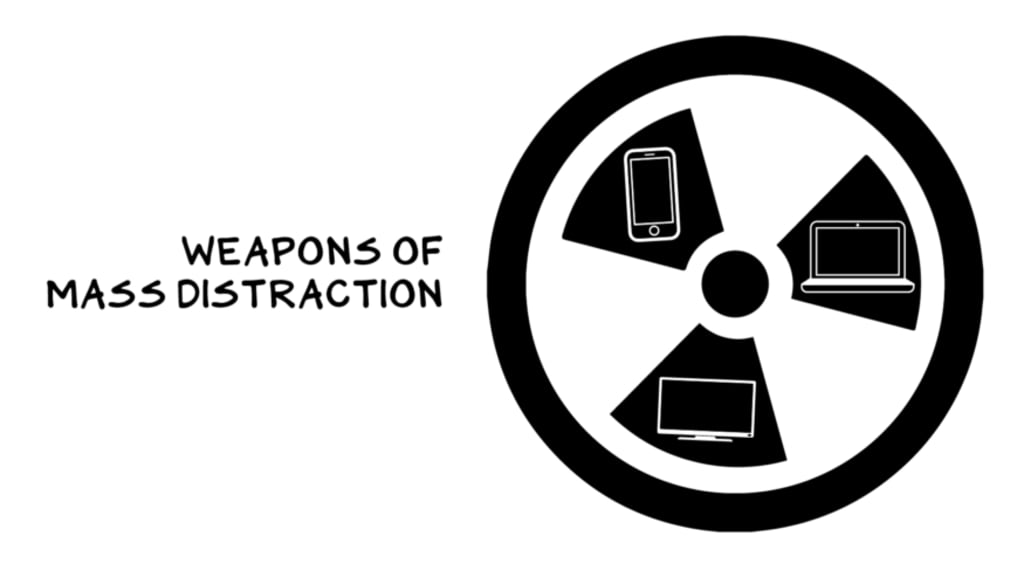
The element fueling economic growth is not a rare earth metal, processing power, or NFTs: It’s attention. The average American spends 11 hours per day consuming media, 65% of their waking life. Roughly 40% of that time is spent on a mobile device. Billions of dollars and millions of person-years are spent capturing and monetizing that attention. The more attention, the more data, the more money, the more relevant offering(s), the more attention … and so on and so on.
The most successful players in the Attention Economy are WMDs: weapons of mass distraction. Meta is a half-trillion-dollar business predicated on diverting attention away from physical life to its apps — advertising generates 98% of its revenue. Google started as a simple digital billboard appended to an industry-leading search bar; it’s morphed into a digital Times Square masquerading as a search engine.
Individuals, too, have turned their attention-capture skills into wealth and power. Social media has been a steroid for reality television, turning suburban teenagers into “influencers,” B-listers into millionaires, and the attention economy has turned game show hosts and comedy actors into presidents. There is real upside in the reshaping of the attention supply chain. From Substack to Spaces, thinkers and entertainers with heft and talent have established distribution channels outside the superstructure of media brands.
On balance, however, WMDs have proven corrosive to the commonwealth. They are highly infectious, as we have no natural immunities. One of the problems with the Attention Economy is the sclerotic lurching from single topic to single topic. We’re losing the capacity to follow multiple threads, with more nuance, at once. We’re becoming a one-track hive mind, when we need to be a community of multithreaded individuals. F. Scott Fitzgerald described intelligence as the ability to hold two opposing thoughts in your head concurrently. Speeding down our one-lane highway with no scenery or opposing traffic is making us stupid.
For the past few weeks, we’ve had our attention diverted by an extraordinary entrepreneur’s quest to become a co-co-co-CEO. We (myself included) went too deep into the paint on this one. My NYU colleague Aswath Damodaran said, “We shouldn’t think of Twitter as some national treasure that needs to be saved,” and he’s right.
On that note, let’s re-embrace our peripheral vision:
Rights
After 50 years of the constitutionally protected right to abortion, a leaked opinion draft alerted us that the Supreme Court is poised to reverse Roe v. Wade. Conservative legislators are filling the gap that will create. Last year, Texas banned abortions after six weeks of pregnancy; Oklahoma followed suit in August; then Governor DeSantis signed into law a ban on abortions after 15 weeks of pregnancy in Florida; new laws in Kentucky mean the state’s last two remaining abortion clinics will close. It’s a profoundly undemocratic movement: Less than a third of Americans want to see Roe reversed, and popular support for prohibiting abortions entirely remains at under 20%.
Reversing Roe is not merely a validation of an extreme minority view. It’s a reversal of what we have come to rely on the Court for: conferring rights, not removing them. Where will this conservative majority go next? Rights not expressly granted by the Constitution undergird our society. Will the Constitution continue to protect gay marriage? Interracial marriage? The Constitution does not expressly obligate that women be treated equally with men, but the Court has conferred that right over and over again. Will it now reconsider? The right of women to vote is guaranteed by the 19th Amendment, but the value of all our votes is protected by the Court’s decisions (not texts) assuming every person’s vote should have equal force.
My mother became pregnant at 47. I’ve written about this. Without her having access to family planning, I would have been tasked with economic responsibility for the household as the 17-year-old son of a single woman who was a secretary. I wouldn’t have attended college, much less gone on to graduate school and founded e-commerce, strategy, and analytics firms. Without the economic security these ventures provided me, I wouldn’t have had kids … full stop. What Trotsky said about war applies to men here. You may not be interested in choice, but choice (specifically the diminution of choice) is interested in you.
War
As Putin loses an information war, he continues to kill thousands in a real war we’re losing interest in.
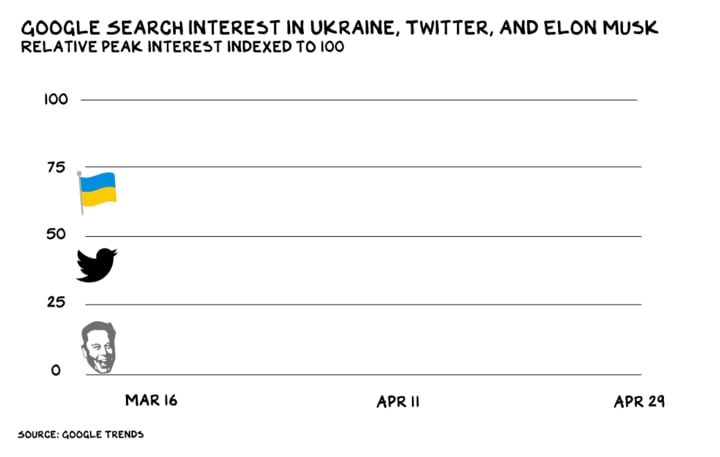
Europe’s superpower is starting world wars, and this is beginning to look like the worst fucking sequel ever. Last week, Ukraine deployed a drone strike that sank two Russian naval boats in the Black Sea. Russia launched missiles into a bridge and a church in Odessa, killing multiple civilians, including a 13-year-old child. An anchor on Russian state television warned the Kremlin could use a nuclear underwater drone to wipe out the U.K. in retaliation for its support for Ukraine. Europe responded with more sanctions, while China offered more rhetorical support for Putin and spread conspiracy theories that the U.S. operates a network of weapons biolabs in Ukraine. Russia has killed twice as many people in Mariupol as Nazi Germany did, and 5.5 million people have fled the nation since the war began.
Recession
It also appears we are headed into a recession. Inflation in the U.S. is at 8.5%, the highest it’s been in 40 years. The price of an average home is up 15%. We’re in the midst of the perfect inflationary storm: A money-printing orgy, supply chains seizing, and the leading producers of energy and goods, Russia and China, fighting wars with neighbors and a virus, respectively. European inflation hit an all-time high of 7.5% last month.
The Rube Goldberg device of economic turmoil (which began with an enemy one-400th the width of a human hair) has, despite our distractions, captured the attention of the market. Roughly half the stocks in the Nasdaq are down 50% from their 52-week highs, a quarter are down 75%, and more than 5% are down 90%. The only comparable drawdowns in Nasdaq history came in 2000 and 2008. The pandemic’s darlings, i.e. high-growth tech companies with online-rooted businesses, are enduring the greatest declines.
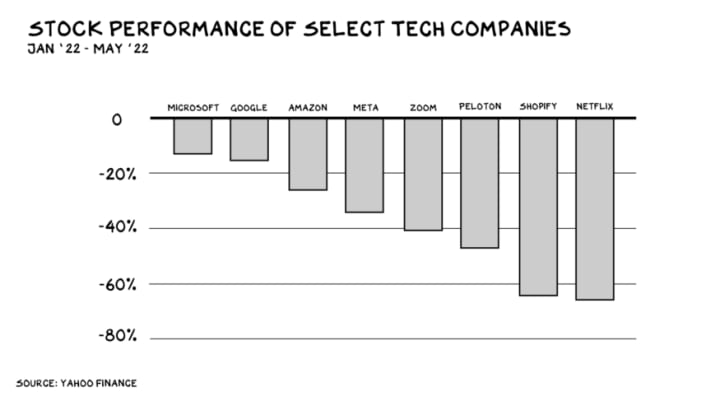
The slide may continue if the Fed makes further interest rate hikes, causing the economy to contract. Until China figures out Covid policies that don’t involve shutting down entire cities, its supply chain woes will rage on — which will continue to push prices up in the U.S. and Europe.
Unstoppable Force
It’s still the Attention Economy, however. And the business iceberg whose mass is hidden underwater by the lack of a daily mark, as it’s private, is not a bird app or Netflix. It’s … TikTok. TikTok’s parent company, ByteDance, is now the most valuable startup in the world — with an estimated valuation of $360 billion, larger than Netflix, Twitter, Snap, Uber, and PayPal combined. Ironically, this was the value of Netflix just six months ago.
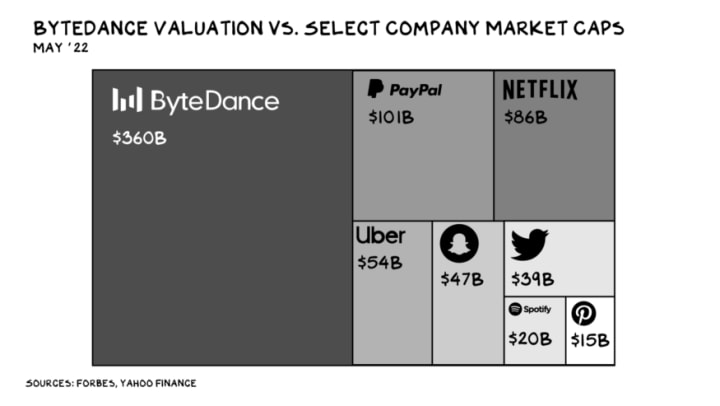
The key to capturing attention is short, addictive bites of entertainment. The New York Times’s acquisition of the quick, five-letter puzzle game Wordle brought millions of new users to its platform. That’s TikTok’s DNA, and the app now commands more engagement per user than Facebook and Instagram combined. It’s producing revenue that’s orders of magnitude greater than the other social media companies can generate.
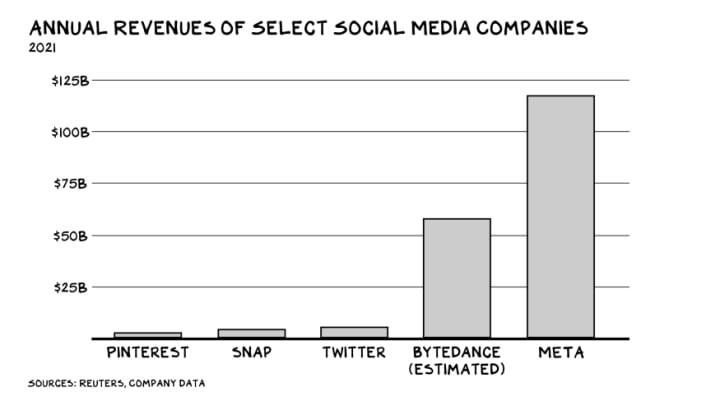
In the first quarter of this year, TikTok surpassed 3.5 billion all-time downloads, becoming the fifth app (and the only one not owned by Meta) to cross this threshold. It was also the most downloaded app this quarter, and for the last five.
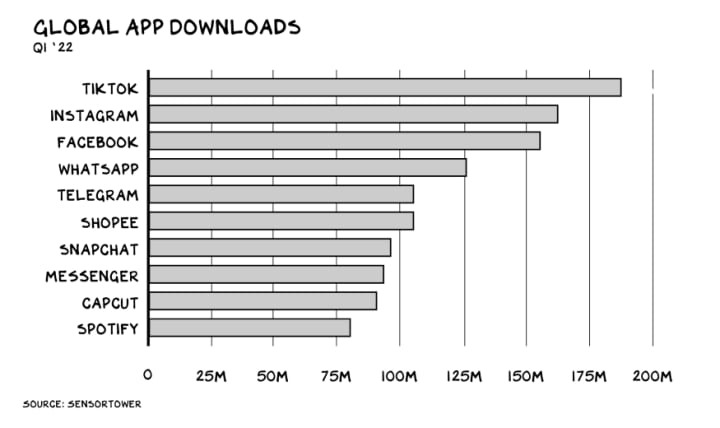
What Facebook did to traditional media and Netflix did to cable TV, TikTok is doing to Facebook and Netflix both. The social media/streaming hybrid has quietly become one of the most powerful WMDs in the world, with a production army of a billion users producing its content for free. This unrivaled reserve of energy is refined by an algorithm that is a supercollider of the TV Guide, TiVo, a remote control, and the brain, choosing between billions of programs (globally) in a fraction of a second. Imagine if Netflix reported that it had reduced its content budget from $17 billion to zero … yet still added new users equal to the populations of Japan and the U.K. No need to imagine, that’s TikTok.
We become what we pay attention to. So we are becoming celebrities people are addicted to … but don’t really care about. I tried to think of a more incisive ending but lost focus.
About the Creator
Vlad Andrei Apostol
Hello dear people! My name is Vlad Andrei and I like to write articles.





Comments
There are no comments for this story
Be the first to respond and start the conversation.